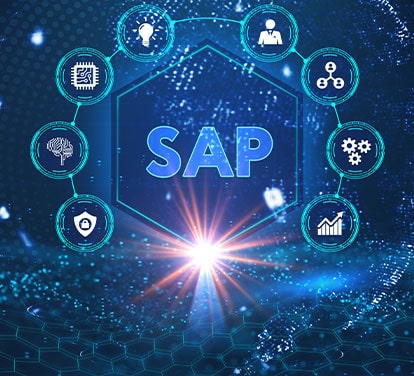How can Oracle Fusion Cloud Integrations help organizations implement business workflow?
In the age of digital transformation, new applications are being adopted within organizations at a rapid, and at times at an uncontrolled pace. There is a growing shift from on-premises applications to cloud or hybrid with both cloud and on-premises components, causing significant challenges for organizations to build an integrated enterprise. An organization that has procured or migrated to Oracle Cloud, encounters various challenges integrating a wide range of Oracle Fusion Application suite with external on-premises and cloud applications. Although there are various tools within Oracle Fusion for data export or other import purposes, IT Consultants and Businesses still face a major challenge in designing a robust, scalable, and easiest integration solutions for specific needs.

The Next Phase of Digital transformation requires Connected Data-driven business
By Vinit Verma
As you can see in the picture below, an enterprise may need to connect Oracle Fusion Applications with many cloud applications, on-premises applications, business partners and various business divisions, etc. Here we see a need to not only connect applications and systems but, also, implement business workflows, synchronize data across the enterprise, set up the right security for internal and external stakeholders, and so on.

What are the major challenges in integrating Oracle Fusion Cloud with other enterprise and legacy applications?
The major challenges are:
- Having Right Integration Competencies: Due to the unique architecture and wide range of Oracle Fusion Cloud Applications, there is a need for a high number of complex REST / SOAP – Led connectivity, which requires highly skilled technical resources.
- Understanding Oracle Fusion Architecture: There are many tools for importing and exporting data for various needs. It requires, deep understanding of these tools to choose the right one for a particular use case.
Multi Steps Invocations: An integration process or flow mostly needs to perform multiple steps in a single flow to perform a particular use case with Oracle Fusion Cloud. For example – If you want to automate the FBDI (File Based Data Import) process to load a single record or bunch of records to Oracle Fusion Cloud from external system then, you will have to perform multiple steps like Calling webservice to Load the file in UCM then submit ESS job to load interface table, submit ESS job to load Base Table.

- Processing High-Volume Data: Being a Large Enterprise ERP Leading product, Oracle Fusion Cloud ERP Software typically needs to connect with a wide range of other enterprise applications. Connectivity with other non-Oracle applications and handling high volume data processing are very challenging.
- Build A Scalable Future State Architecture: Considering the future process, the state is of paramount importance because we must evaluate all integrations in future. Considerations whether certain integrations could become obsolete or need any rework need attention.
- Transform Complex Data: Traditional Complex Data Transformation leads to massive coding and results in poor performance and high cost maintaining systems.
- Select the Right Integration Platform: There are various integrations tools and platforms in the market, choosing the right one which fits the organization's requirement is another big challenge. Please refer to 4 Key Steps to Consider While Choosing an Integration Platform which will help in making the right decision.
We must decide on all these factors. Even though there will be some unavoidable complexities while implementing integration processes we need to decide on the right strategies of integrations to mitigate risk and cost of re-building the integrations, testing all integrations, and re-validate all business processes.
What are the main methods available for inbound and Outbound Integrations within Oracle Fusion Cloud?
There are mainly two categories of Integration methods:
- Inbound Integration Methods
Outbound Integration Methods

Inbound Integration Methods: There are three majorly used inbound methods
- File-Based Data Import (FBDI): Oracle provides a method to load data using pre-generated CSV format. Right automation of this process using the right integration platform can get you derive maximum value out of this.
- Web Services: There is a massive list of web-services to perform various tasks. Although it provides a standardized way to integrate two web applications and establish communication, it is very important to have the right architecture to simplify the overall process. If you need to call multiple web-services for a particular use case, you should implement the web-services calls in proper sequence for better performance, should have easy re-processing logic for failed records, and a robust error and exception handling mechanism.
- Spreadsheet Data Loader (ADFdi): These are part of the ADF Framework that enables desktop integration with Excel Sheets. It can help manage large volume data uploads into Oracle cloud applications.
Outbound Integration Methods: There are three majorly used outbound integration methods
- BI Reporting Tools: It can be used to extract data from Cloud applications for further analysis and import into external systems via XML, EXCEL, CSV, or other file types. Oracle Transactional Business Intelligence (OTBI) can be used to export data to import into external systems. OTBI provided the ability to build custom queries on transactional data and the output can be downloaded to Excel, you can configure an OTBI or BI Publisher Report and generate the output based on your organization's specific requirements. Report output extraction can also be automated using report service. If BI reports can be automatically pulled and loaded to external systems as per business needs. It can help an organization save a lot of costs and efforts.
- Web Services: There are web services available to extract data out of Oracle Fusion Cloud. But the areas, where web services are not available generating BI Publisher or OTBI reports can be used for integration may suffice depending on what is being integrated.
- Financial Extracts: The Financial Data Extracts empowers business enterprises with the capability to extract financial data from the Oracle ERP Cloud and seamlessly integrate with on-premises systems, legacy systems, and other cloud systems. The seeded Financial data extracts were introduced in R12. The data extract is provided in an XML or CSV format for end-user review and direct automated integration with other systems. Users can incrementally extract data. These data extracts are performed as scheduled processes in cloud financials and can be used to support co-existence scenarios. These financial data extracts can also be automated with the help of the right integration platform like Oracle fusion cloud financials.
As we understand, there are many methods of integration with Oracle Fusion Cloud. A right Architecture, A right Low-Code Integration Platform, Right skill sets can help to automate each of these methods for faster and efficient integration of Oracle Fusion Cloud with external Cloud and on-premises applications.
Recommendations: At Jade Global, our team of Integration and Oracle Experts have been helping many Organizations in Implementing a Robust and Scalable Oracle Fusion Cloud Integration. In this journey, we came across various Leading Integration Platforms and implemented for our customers. Although, Jade Global is Product Agnostic, one which we prefer most based on our experience and results is, Boomi Cloud Integration Platform.

Boomi is a Unified near to zero code drag-n-drop platform. It not only helps in integration but helps in synchronizing the data across enterprise using Boomi Master Data Hub, helps in creating workflow applications using Boomi Flow, helps in connecting partners and suppliers using it’s EDI capabilities and helps innovate new products and services using it’s robust API Management Platform. Especially, Oracle Fusion Cloud Integrations come up with many challenges and we have faced some of the technical glitches with other platforms handling Oracle Fusion messages, but we didn’t face the same with Boomi Integrated Platform. Please refer A Faster, Simpler Way to Integrate With Oracle Fusion Cloud
Click to learn more about our Boomi Implementation Services













